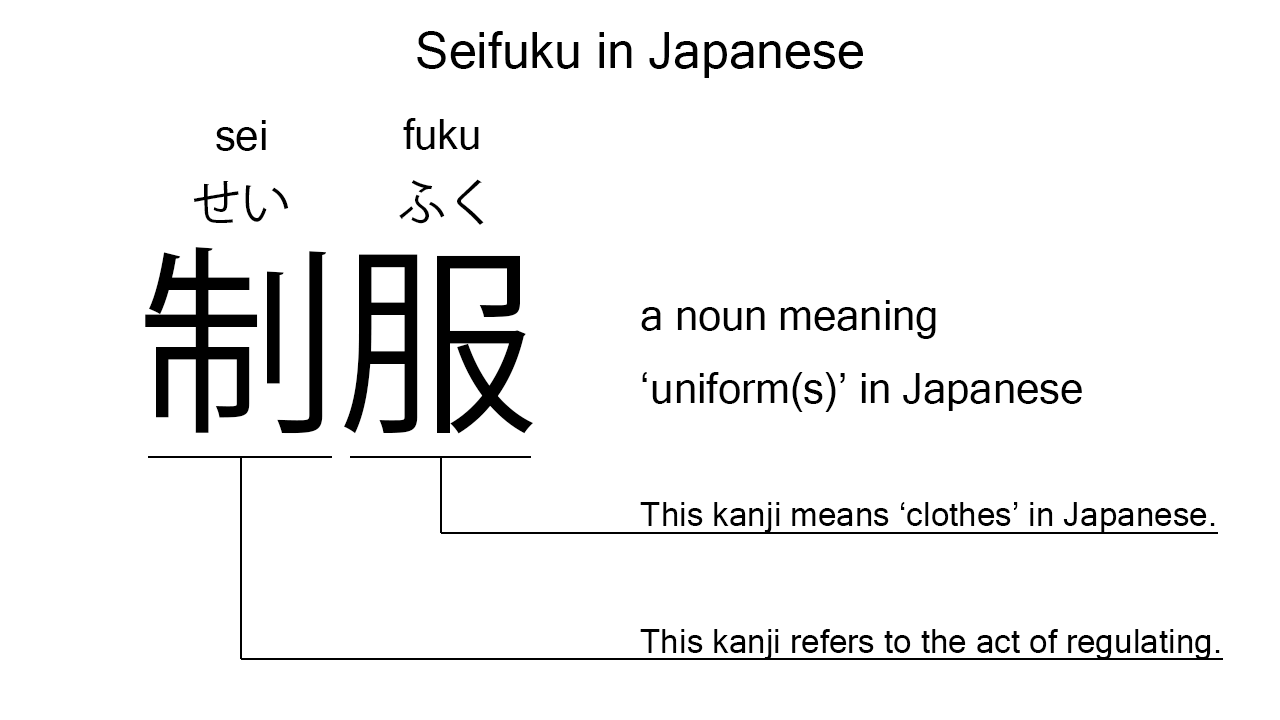What does “seifuku” mean in Japanese?
There are homophones, but native speakers say “seifuku” normally to mean ‘uniform’ in Japanese. Perhaps, some Japanese learners know this word as it is sometimes used in Japanese movies, songs, novels, manga, anime, and the like. In this blog post, however, I will explain this word in detail based on its kanji expression. And also, I will explain how to use it through example sentences. My explanations would help Japanese learners understand “seifuku” more clearly. Then, let’s get started!
Contents
Definition and meanings of “seifuku”
Let me start with the definition and meanings of “seifuku”.
- seifuku – 制服 (せいふく) : a noun meaning ‘uniform’ or specifically ‘school uniform’ in Japanese. This can also work as plural. Learn more about Japanese plural.
The definition and meanings are not that difficult. To understand this noun more clearly, however, let me explain its kanji characters in detail, one by one.
What does “seifuku” literally mean in Japanese?
The kanji expression of “seifuku” consists of the following two kanji characters:
- 制 : a kanji character used to refer to the act of regulating or such.
- 服 : a kanji character widely used to mean ‘clothes’ in Japanese.
These two kanji characters tell us that the formed noun literally means ‘regulated clothes’ in Japanese. This literal interpretation is not completely in line with the actual meanings, but still understandable, I think. Uniforms are often clothes which people wear regularly.

When we meet new kanji expressions, we should check their kanji characters in detail to understand their meanings clearly and deeply. In many cases, kanji characters tell us a lot about the meanings of the expressions they form. Actually, here, we could get the better understanding of “seifuku” through the detailed kanji check above.
So far, I’ve explained the definition and meanings of “seifuku” together with its kanji characters. Then, let me explain how to use it through the example sentences below.
Example #1: how to say “school uniforms” in Japanese
kanojo tachi wa mainichi seifuku wo kiru – 彼女達は毎日制服を着る (かのじょたちはまいにちせいふくをきる)
They wear school uniforms every day.
Below are the new words used in the example sentence.
- kanojo – 彼女 (かのじょ) : a pronoun meaning ‘she’ in Japanese.
- tachi – 達 (たち) : a suffix used after a noun or pronoun to make its plural form. In the example, this is used after “kanojo” to make its plural form, “kanojo tachi”, which means ‘they’ in Japanese.
- wa – は : a binding particle working as a case marker or topic marker. In the example, this works after “kanojo tachi” to make the subject in the sentence.
- mainichi – 毎日 (まいにち) : a noun meaning ‘every day’ in Japanese. This can also work as an adverb almost anywhere in a sentence. In the example, this works as an adverb in the middle of the sentence to say “every day” in Japanese.
- wo – を : a case particle used to make the object word in a sentence. In the example, this is used after “seifuku” to make the object in the sentence.
- kiru – 着る (きる) : a verb meaning ‘to wear’ in Japanese.
This is a typical usage of “seifuku”. In this example, it works as a part of the commonly-used phrase, “seifuku wo kiru”, which means ‘to wear school uniforms’ in Japanese.
Example #2: another usage of “seifuku”
watashi wa kono seifuku ga suki desu – 私はこの制服が好きです (わたしはこのせいふくがすきです)
I love this school uniform.
Below are the new words used in the example sentence.
- watashi – 私 (わたし) : a pronoun meaning ‘I’ in Japanese.
- kono – この : a determiner used before a noun which refers to something close to the speaker. In the example, this is used before “seifuku” to say “this school uniform” in Japanese.
- ga – が : a case particle used to make the subject word or the object word in a sentence. In the example, this is used after “kono seifuku” to make the object in the sentence.
- suki – 好き (すき) : the stem part of the na-adjective, “sukina”, which means ‘favorite’ in Japanese. Native speakers, however, often use this as an individual word to mean ‘to like’ or ‘to love’ in Japanese. In the example, this is used to mean ‘to love’.
- desu – です : an auxiliary verb used after a noun or adjective to make it polite. Probably, this is well known as a part of Japanese desu form. In the example, this is used after “suki” to make it sound polite.
This is another typical usage of “seifuku”. In this example, it works together with “kono” to mean ‘this school uniform’ in Japanese. When we want to mean an ‘uniform’ or specifically ‘school uniform’ in Japanese, anyway, “seifuku” is always a very good option.
Summary
In this blog post, I’ve explained the definition and meanings of “seifuku” in detail based on its kanji expression. And also, I’ve explained how to use it through the example sentences. Let me summarize them as follows.
- seifuku – 制服 (せいふく) : a noun meaning ‘uniform’ or specifically ‘school uniform’ in Japanese. This can also work as plural. These two kanji characters literally mean ‘regulated clothes’ in Japanese. This literal interpretation is not completely in line with the actual meanings, but still understandable, I think. Uniforms are often clothes which people wear regularly.
Hope my explanations are understandable and helpful for Japanese learners.